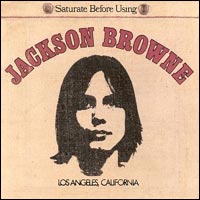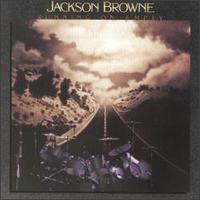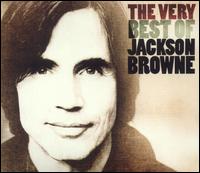|
Music Reviews
Alternative
Blues
Books
Christmas
Classic Rock
Country
Jazz
Lounge
Oldies
Power Pop
Punk & New Wave
Reggae
Rhythm & Blues
Seventies
Texas
Special Features
Randy's Rodeo
Sex Pistols
Motown
Halloween
Valentine's Day
Information
About Me
Feedback
Links
User's Guide
Support Me
Amazon
iTunes
Sheet Music Plus
|
Sock it to me, Santa! Visit my other website, www.hipchristmas.com Visit my other website, www.hipchristmas.com
 In the
world of rock & roll, Jackson
Browne holds a special place. His music - tender and contemplative, sometimes
dark and morose - was a vanguard of the "mellow" Southern California
style that cast a long shadow throughout the 1970's. Compadres like Linda Ronstadt
and the Eagles sold lots of records by taking his style (and sometimes his
songs) and translating it into a more cheerful idiom. Frustratrated by the
limitations of the genre and, my guess is, bored with himself, Browne later
tried to break out of his shell - both personal and musical - and went to great
lengths to have a positive impact on the world outside. But, his forte has
always been exploring and exposing his own psyche for the benefit of us all. In the
world of rock & roll, Jackson
Browne holds a special place. His music - tender and contemplative, sometimes
dark and morose - was a vanguard of the "mellow" Southern California
style that cast a long shadow throughout the 1970's. Compadres like Linda Ronstadt
and the Eagles sold lots of records by taking his style (and sometimes his
songs) and translating it into a more cheerful idiom. Frustratrated by the
limitations of the genre and, my guess is, bored with himself, Browne later
tried to break out of his shell - both personal and musical - and went to great
lengths to have a positive impact on the world outside. But, his forte has
always been exploring and exposing his own psyche for the benefit of us all.
Jackson
Browne (sometimes known as Saturate Before Using -
those words appear on the cover) was an auspicious debut, containing "Rock
Me On The Water" and "Doctor My Eyes" - both of them hit singles
- but it was merely a potent of things to come. The follow-up, For
Everyman, was even better, mixing raucous, David Lindley-fueled tunes
like "Redneck Friend," "Take It Easy" (cowritten with
Glen Frey), and the amusing "Ready Or Not" with navel-gazers like "These
Days" and the title song. The third album, Late
For The Sky, was his darkest - and best - yet. Introspective and morbid
(the best songs were about death), critics loved it. Life imitated art, though,
when Browne's wife committed suicide; his next album, The
Pretender, was a moving statement of love, loss, and rebirth, as well
as a harrowing look at life among the (not so) beautiful people of Los Angeles. "The
Fuse," "Here Come Those Tears Again," "Your Bright Baby
Blues," "Sleep's Dark & Silent Gate" and the title cut
are among Browne's most fully realized songs, as thrilling in performance
as they are in message. To my ears, The
Pretender is Jackson Browne's masterwork.
 After
looking inward for so long, Jackson Browne valiently tried to transform himself and
address the world-at-large. His first tentative step was wildly successful, artistically
and commercially. A concept album performed partly in concert, Running
On Empty (1977), was packed with enjoyable, hummable odes to the road. Record buyers
responded in kind, for once, with the critics who, with ample reason, declared Running
On Empty one of the best live albums ever. Browne failed to maintain that altitude,
though, as his next records - Hold
Out (1980) and, especially, Lawyers
In Love (1983) - became forced and self-conscious. Dissatisfied with the "sensitive" label
he was yoked, Browne began to ape the populist rock of Bruce Springsteen and the calculated
cynicism of Warren Zevon. While Browne sounded he like was having immense fun, songs
like "For A Rocker" were stiff and unwieldly - surely not the vibe he sought. After
looking inward for so long, Jackson Browne valiently tried to transform himself and
address the world-at-large. His first tentative step was wildly successful, artistically
and commercially. A concept album performed partly in concert, Running
On Empty (1977), was packed with enjoyable, hummable odes to the road. Record buyers
responded in kind, for once, with the critics who, with ample reason, declared Running
On Empty one of the best live albums ever. Browne failed to maintain that altitude,
though, as his next records - Hold
Out (1980) and, especially, Lawyers
In Love (1983) - became forced and self-conscious. Dissatisfied with the "sensitive" label
he was yoked, Browne began to ape the populist rock of Bruce Springsteen and the calculated
cynicism of Warren Zevon. While Browne sounded he like was having immense fun, songs
like "For A Rocker" were stiff and unwieldly - surely not the vibe he sought.
Subsequent records found him dabbling in world music and moving even farther outside
himself, into the political arena; Lives
In The Balance (1986) and World
In Motion (1989) yielded mixed results, but they felt more natural and sincere
than Browne's preceding albums. Beginning with I'm
Alive (1993), though, Jackson Browne returned to the role that he, more than anyone
but Joni Mitchell and James Taylor, helped establish - that of singer/songwriter. His
later work has been consistent and familiar, if not spectacular.
 Jackson
Browne's first-ever retrospective was the half-hearted The
Next Voice You Hear: The Best Of Jackson Browne (1997), an album that essentially
pleased no one - casual fans or serious collectors. First of all, the track selection
is shoddy, even within the limitations of a single disc. Out of its 15 tracks, The
Next Voice You Hear collects only 6 of Browne's 17 charted singles. Second, Browne's
work simply doesn't lend itself to this kind of listening. Frankly, there is no way
one CD could hold "the best" of Jackson Browne, and even if it could, his
considerable musical and spiritual evolution over the past 30 years would make for
some jarring transitions. His first five records are the definitive Jackson Browne;
I recommend you get them and see where they lead. Jackson
Browne's first-ever retrospective was the half-hearted The
Next Voice You Hear: The Best Of Jackson Browne (1997), an album that essentially
pleased no one - casual fans or serious collectors. First of all, the track selection
is shoddy, even within the limitations of a single disc. Out of its 15 tracks, The
Next Voice You Hear collects only 6 of Browne's 17 charted singles. Second, Browne's
work simply doesn't lend itself to this kind of listening. Frankly, there is no way
one CD could hold "the best" of Jackson Browne, and even if it could, his
considerable musical and spiritual evolution over the past 30 years would make for
some jarring transitions. His first five records are the definitive Jackson Browne;
I recommend you get them and see where they lead.
On the other hand... The
Very Best Of Jackson Browne (2004), compiled by Rhino Records, almost does the
trick. While its two CD's don't allow for everything (for instance, "Ready or
Not," "The Fuse," and "Hold Out, Hold On" are omitted),
the set samples from Browne's every album and picks up "Somebody's Baby," his
amiable single from the movie Fast Times At Ridgemont High. The
Very Best Of Jackson Browne does an admirable job of presenting a coherent picture
of this important artist's sometimes shambolic long journey home. Again, I cannot
express too strongly the importance of his first decade's work, but The
Very Best Of Jackson Browne will be an enjoyable, worthwhile purchase for most
consumers.
|
|